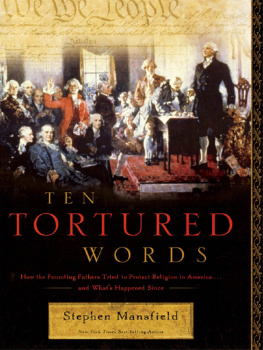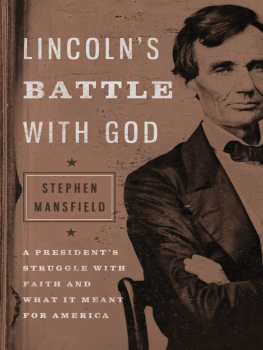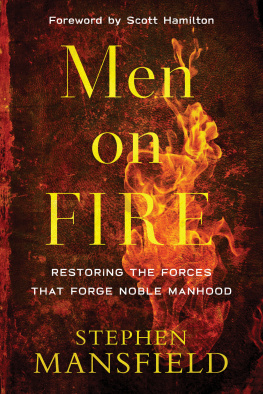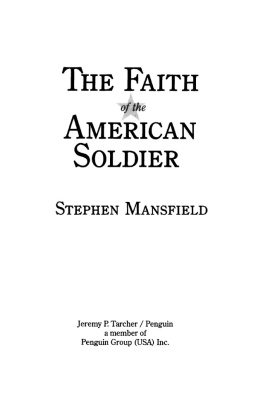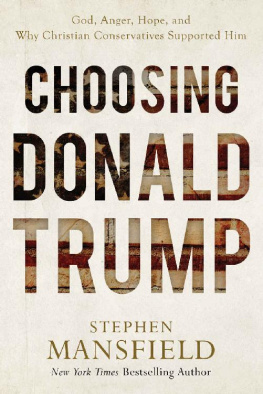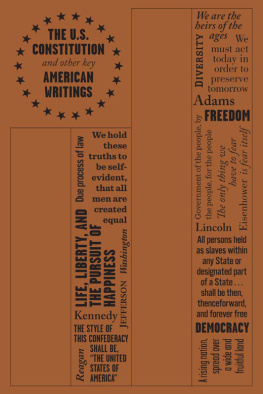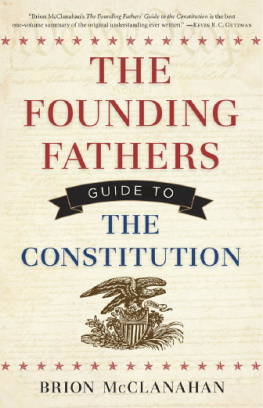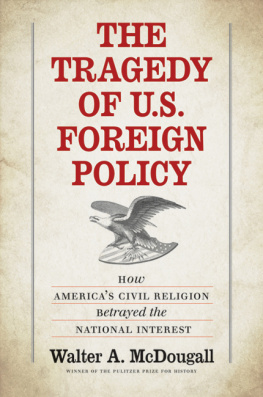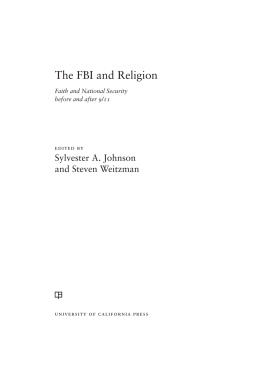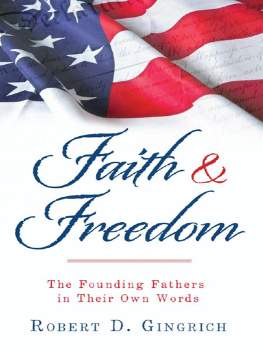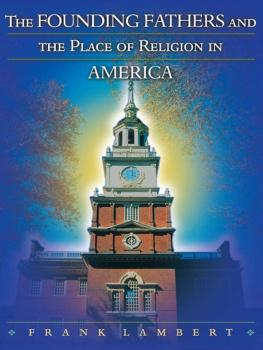TEN TORTURED WORDS
ALSO BY STEPHEN MANSFIELD
Never Give In:
The Extraordinary Character of Winston Churchill
Faithful Volunteers:
The History of Religion in Tennessee
Then Darkness Fled:
The Liberating Wisdom of Booker T.Washington
More Than Dates and Dead People:
Recovering a Christian View of History
Forgotten Founding Father:
The Heroic Legacy of George Whitefield
The Faith of George W. Bush
The Faith of the American Soldier
Benedict XVI: His Life and Mission
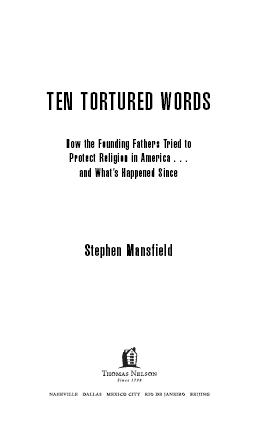
Copyright by Stephen Mansfield, 2007
All rights reserved. No portion of this book may be reproduced, stored in a retrieval system, or transmitted in any form or by any meanselectronic, mechanical, photocopy, recording, scanning, or otherexcept for brief quotations in critical reviews or articles, without the prior written permission of the publisher.
Published in Nashville, TN, by Thomas Nelson. Thomas Nelson is a trademark of Thomas Nelson, Inc.
Thomas Nelson, Inc., titles may be purchased in bulk for educational, business, fund-raising, or sales promotional use. For information, please e-mail SpecialMarkets@ThomasNelson.com.
Library of Congress Cataloging-in-Publication Data
Mansfield, Stephen, 1958
Ten tortured words : how the founding fathers tried to protect religion in America... and what's happened since / by Stephen Mansfield.
p. cm.
Includes bibliographical references and index.
ISBN 10: 1-59555-084-4
ISBN 13: 1-59555-084-2
1. Church and stateUnited StatesHistory. 2. Freedom of religionUnited States. 3. United States. Constitution. 1st Amendment.
I. Title.
KF4865.M29 2007
342.7308'52dc22
2007013017
Printed in the United States of America
07 08 09 10 QWM 1 2 3 4 5 6
To my children,
Jonathan and Elizabeth,
and the faithful in their generation
That which thy fathers bequeathed thee,
Earn it anew if thou wouldst possess it.
A Celtic Maxim
CONTENTS
The words alone are uninspiring. They are, like the document in which we find them, more procedure than poetry, more policy than prose. None of the grand language of the American drama is here. There is nothing to rival Thomas Jeffersons when in the course of human events or Abraham Lincolns new nation conceived in liberty.
Instead, the words are prohibitive, almost angry. They explain what must not be done by an institution that had done it for far too many centuries and to the detriment of the human soul. Throughout most of history, the priest and the king had been one. Thus, from the days of ancient Babylon to the imperial spread of Rome, from the god-kings of Asia to the royal Defenders of the Faith in Europe, religious obedience had been commanded by the State. Dissenters were banished or tortured or killed.
But no more. In this American Novus Ordo Seclorum, in this new order of the ages, religion would thrive, but the State would not command it. The wisdom of faith would always be welcomed into the corridors of political power, but the dictates of faith would always be left to the individual conscience and the liberated mind.
So when the fathers of America had fashioned their covenant, their Constitution, and soughtin truth, as an afterthoughtto secure the rights of the individual against the strength of government, they told the most powerful institution in their new nation what it must not do:
Congress shall make no law respecting an establishment of religion.
These were the first ten words of the American Bill of Rights, and they were a miracle of history. For the first time in human experience, the legislative power of a nation was forbidden from legislating the conscience of man. There would be no establishment of religion, no state church or official religion. Faith would be celebrated but not commanded. Worship would be protected but not prescribed. The fathers had even guaranteed it with a second phrase they added to these historic first ten words. Not only would Congress make no law respecting an establishment of religion, but it would also never prohibit the free exercise thereof. Together the sixteen words stood guard on the ramparts of the new nation against the tyrannical tendencies of the centuries.
And religion thrived. The institutions of faith multiplied, religious revivals transformed whole communities, and immigrant faiths were welcomed, though not always without initial challenge. The elected representatives of the people, recognizing that religion was essential to the brand of national character that allowed free institutions to flourish, fanned the flames of faith. The peoples Congress ordered the printing of Bibles, called for days of prayer and fasting, positioned chaplains in the armed services as well as in its own assemblies, funded missionaries to the natives of the land, and even sponsored church services in government buildings, as we shall see. It was not paradise, but it was an attempt on the part of a national government to encourage religion in general without demanding religion in particular.
Meanwhile, the individual states that had created this federal government were permitted to be as religious as they wanted to be. They were, after all, close to the people. They were local and ethnic and near. Their constitutions could honor whatever faith the people held dear, and their schools could require competence in whatever truths the people wished to pass on to the next generation. It was the national Congress that had been addressed in the ten historic words because everyone understood that this national Congress had to be bound tight against the expansive arrogance of political power: Congress shall make no law respecting an establishment of religion. States could do as they pleased because their citizens could always vote a change or move elsewhere in the country. There was no escaping the reach of the national Congress, though.
So it was in America, and not just at the dawn of the nations life. For 150 years, this delicate religious balance prevailed. There would be no national church, but there would be national encouragement of faith. There would be no official religion, but the states could nurture as vibrant a faith as the people wished. So solid was this arrangement, so clear this vision of religion and government, that the Supreme Court was not even called upon to issue a ruling directly related to it until just after World War II, more than a century and a half after the defining words were first penned.
Yet that ruling was a disaster. In 1947, the majority opinion in a case called Everson v. Board of Education dismantled the wise configuration of the American fathers and erected instead a confusing and nearly unenforceable mishmash of prohibitions. The Supreme Court forbade the federal government from passing laws that aid religion or using tax money in any amount to support religion or religious institutions. It was a break from history, a break from the plain sense of the ten noble words, and, for reasons to be discussed later in these pages, it was a prohibition that applied not only to the federal government but to the states as well.
To justify this rejection of the American fathers design, the Supreme Court cited the words of a letter written by Thomas Jefferson and concluded that the intent of the first ten words of the First Amendment was to erect a wall of separation between church and state. It did not matter that Thomas Jefferson wrote this letter some fourteen years after the First Amendment became law. It did not matter that Thomas Jefferson was not even in the country during the convention that drafted the First Amendment. Nor did it matter that Jeffersons words were used in a manner that Jefferson himself would not have approved.What
Next page
